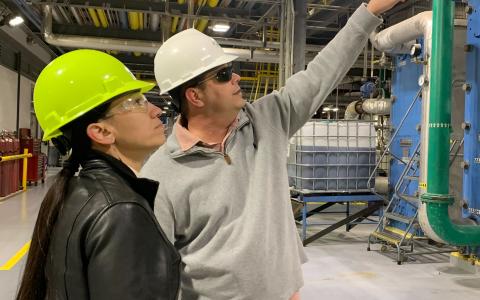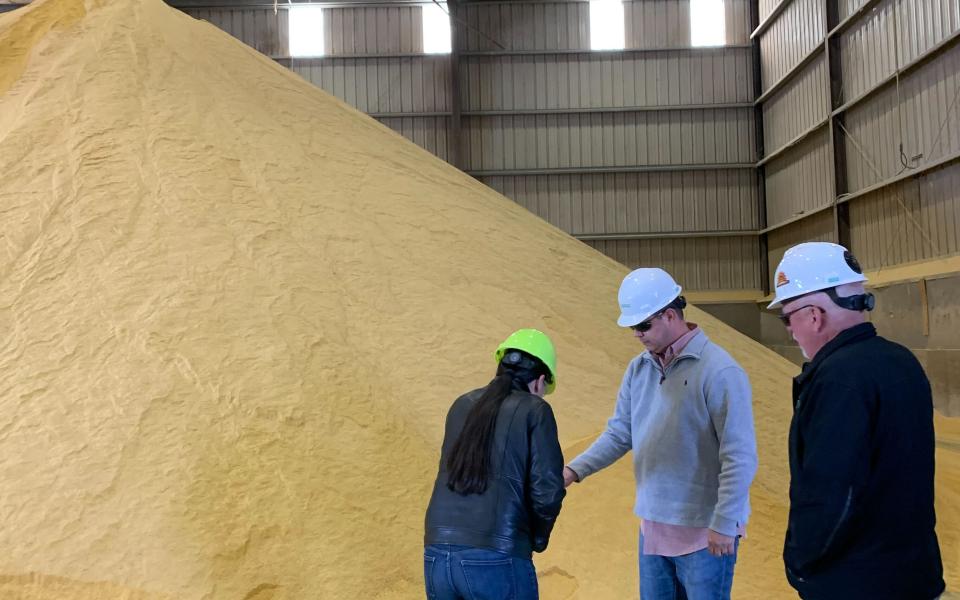Davids Visits Garnett Ethanol Plant on Farm Tour, Highlights Support for Kansas Agriculture and Lower Gas Prices
GARNETT, KS – Today, Representative Sharice Davids visited East Kansas Agri-Energy (EKAE), a Garnett-based renewable ethanol producer, as part of her Farm Bill listening tour. Her tour will continue at farms, ranches, and businesses across the Third District as Davids prepares to consider the 2023 Farm Bill through her position on the House Agriculture Committee. Davids was joined by representatives of Kansas Corn, whose members grow and supply corn to the plant, to discuss how ethanol production supports local agriculture and lowers costs at the gas pump.
"Finding ways to lower costs for Kansas families and support local agriculture have been major priorities of mine. Today, I got to see an example of how we can do both of those at the same time," said Davids. "The folks at East Kansas Agri-Energy are supporting our local farmers, creating good-paying jobs, and producing sustainable ethanol that can be used as fuel, lowering the cost of gas for Kansans. I'm excited to bring what I learned back to Washington and to continue listening to Kansas' agriculture community on how I can best advocate for them."

Rep. Sharice Davids touring East Kansas Agri-Energy (EKAE), a Garnett-based ethanol plant with Bill Pracht, EKAE, and Greg Krissek, Kansas Corn.
"We're very glad that Representative Davids was able to come down to our plant, which represents the only ethanol plant in the Third District," said Bill Pracht, CEO of East Kansas Agri Energy. "I hope this visit helps further her education on ethanol."
"We appreciate Rep. Davids visiting the Kansas Corn office and East Kansas Agri-Energy in Garnett to learn about the Farm Bill, ethanol production, and consumer education," said Greg Krissek, CEO, Kansas Corn.
Davids' EKAE tour is her eighth stop on her Farm Bill listening tour. The ethanol-production plant converts more than 16 million bushels of corn into about 42 million gallons of fuel grade ethanol per year. Because this ethanol is produced domestically from local products and at a cheaper rate then unleaded gasoline, it lowers the cost of gas for Kansans, reduces reliance on foreign oil, and improves domestic supply chains. EKAE, which received federal funding to assist with business operations during the COVID-19 pandemic, has around 40 full-time employees and relies heavily on Kansas corn producers to supply the crops needed to make the biofuel.

Rep. Davids, Bill Pracht, and Greg Krissek discuss crops produced by local farmers that are converted to ethanol.
Davids previously supported legislation to support alternative fuel production and lower gas prices for Kansans. She voted to allow retailers the ability to sell higher ethanol-blended fuels year-round and to promote sustainable aviation fuel and expand biofuels infrastructure, opening up new market opportunities for sustainable fuel sources and lower energy costs for Kansas families. Last year, Davids also pushed the President to suspend the federal gas tax, providing immediate relief to Kansans at the gas pump.
Ethanol and other bioenergy-related policy is included in the Farm Bill, a package of legislation that is typically renewed every five years and determines federal agriculture and nutrition policy impacting Kansas families both urban and rural. To prepare for the 2023 Farm Bill, Davids has visited an organic vegetable farm in Johnson County, a community-based education farm in Wyandotte County, a poultry and meat farm in Anderson County, a co-op in Franklin County, and a no-till farm in Miami County.
Last year, Davids hosted U.S. Department of Agriculture Undersecretaries Jennifer Lester Moffitt and Xochitl Torres Small for visits to the Third District to learn about the area's meatpacking and dairy industries, respectively. She was also named a Friend of the Farm Bureau by the Kansas Farm Bureau in 2022.